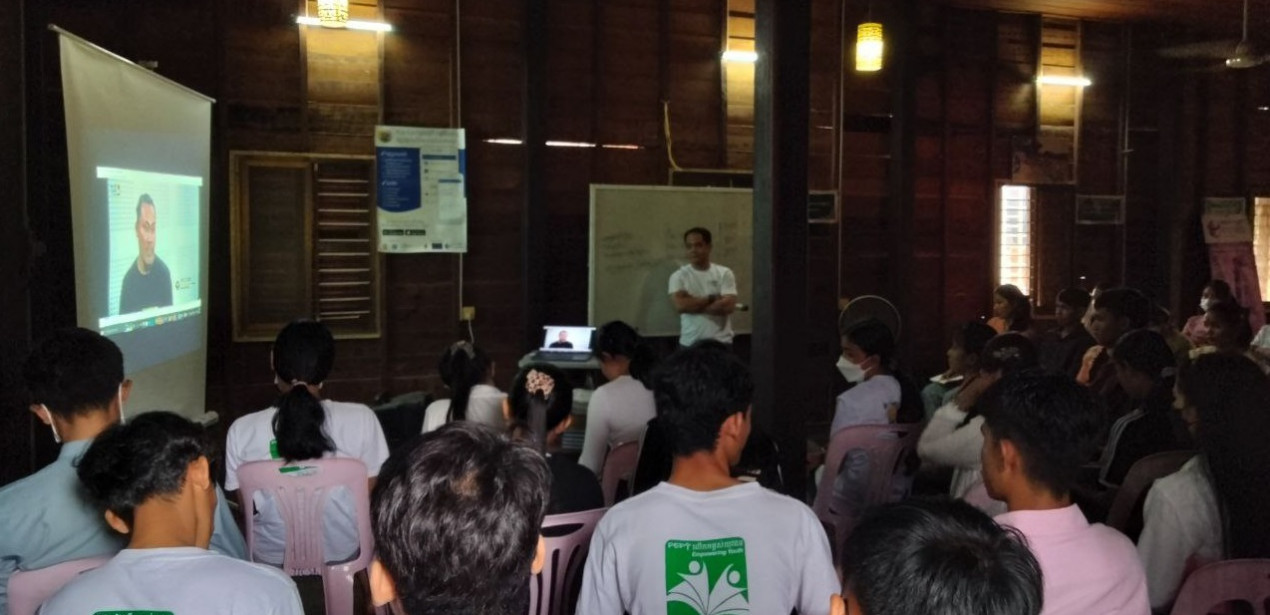
Why do youths feel digital training seemingly unnecessary?

Writen by: Kheav Moro Kort, junior digital literacy researcher
.jpg)
I had a chance to work as a junior digital literacy researcher for Sour Mouy. In collaboration with Sidekick, Sour Mouy employed the human-centered approach to research to explore why youths do what they do, seeking the reasons and understanding the emotions behind their action. The study selected samples from the three provinces based on factors, such as early dropout rates, incomes, and large ethnic populations. The findings of the research show that the digital lives of rural youth coming from low-income and education backgrounds are completely drowned in an ocean of pirated and scam-related content preying on their vulnerabilities, emotions, and fears. The digital content they, especially those with less income and education, consumed was almost 100 percent generated for the sole purpose of alluring or soliciting the person to accumulate online traffics such as “Like Farming or Like Harvesting”, as the findings demonstrated.
The term Like Farming can be described as a technique in which scammers produce attention-getting posts designed to get many likes and shares. Once a page has reached enough likes to get a decent amount of traffic, it may be stripped of its original content and sold on the black market along with the personal information of followers and users who have engaged (like, react, share, comment) with it. The content served to them through matching algorithms can turn them into unconscious victims or accomplices in a modern generation of internet scams run by our behaviours and emotions. Because humans are emotional beings, often their decisions and actions are driven by their intuition and impulse rather than logic and contemplation.
Throughout the interviews with rural youth informants, it comes to light that most of the rural youth are hard struggling with using social media apps and digital devices like smartphones. On top of that, training on how to run smart devices and apps are not seemingly necessary for them, despite their limited education. This shall reflect that digital literacy is being disregarded. The media content from sites or pages they engaged with was published without proper fact-checking mechanisms in place and being disseminated publicly from one to another. In the simplest sense, the contents they get mostly stemming from unreliable sources, unlike contents or information backed up with strong evidence and announced by news media or government agencies. Instead of just reacting and sharing, what rural youth should do is to be more aware of what they are consuming, the potential risks, be more responsible netizens, and more engaged with their own choices.
Embracing media/digital literacy and critical thinking for effective use of social media is essential. Ones may know and understand the importance of having strong passwords and turning on the two-step verification process. But as digital illiterate, one may not realize the true nature of the daily contents they are consuming. Some types of content are pirated and scammed. Even if you are tech-savvy, it does not necessarily mean that you are always able to differentiate between fake and real news; therefore, one should equip themselves with media, digital literacy, and critical thinking skills.
Media literacy is regarded as an ability to apply critical thinking skills into signs or symbols and messages that are transmitted through media. These essential 21st-century skills allow us to fully understand and evaluate all of the messages we encounter on a daily basis, leading us to make better choices about what we should choose to watch, read, and listen to. Media education navigates us through a complex media landscape to become more discerning, sharp in judgement, and to be thoughtful media consumers and users.
Music, videos, TV shows, text messages, social media, online video games, advertising, news, educational contents, radio, newspapers, and other numerous forms of information are also considered media. To critically evaluate and analyse the content published, media literate looks at it from three angles, such as emotional, technical, and cognitive angle. Emotional skills in media literacy are about being aware of your own emotions and how you react towards a certain post. The technical angle here focuses on the state of being aware of how the platform (for example: Facebook, Instagram or Tiktok) works. Whereas cognitive aspects are concerned with the identification of reliable sources on social media; for instance, by analysing the number of followers, likes, published date or the user’s biography, etc.
Being able to critically think about social media posts and online stories makes you a smart consumer of those products. The ability to understand how media is constructed and to identify the roles of media play in society, specifically politics, the values embedded and the beneficiaries from pushing those values are such invaluable skills. With skills in hand, time will not be wasted. These skills enable us to pass on the knowledge we have to other people and also to prevent certain media from dominating or exacerbating the society.
Constantly and regularly asking yourself about social media posts you consume and engage with (like, share and comment), the nature and the way posts have been created, the motivation or purposes of the producer will somehow guide you to be a well-informed and critical media consumer. The goal of media literacy is not to prevent people from consuming media, but to transform people to become more informed and literate media consumers, helping them from being fall victims or unconscious accomplices of the dark side of social media.




